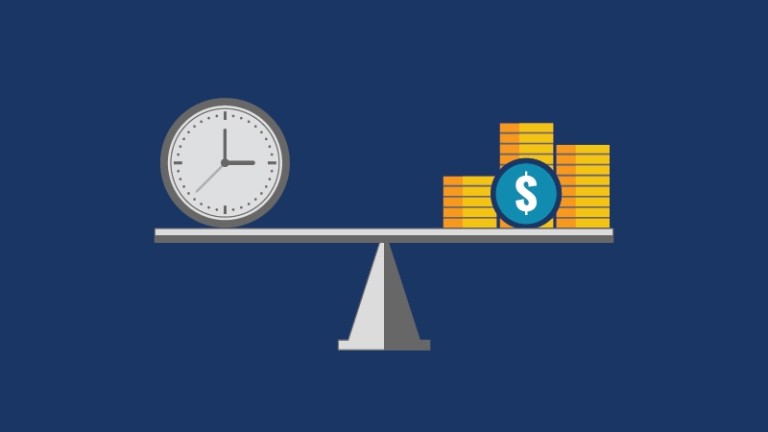Start saving: the sooner the better
When I was young, saving money was a pipe dream. My income was inconsistent (thanks, waitressing!), and I was living from paycheck to paycheck for the most part. Budgeting was difficult and the idea of having something leftover at the end of the month felt laughable.
I had a laundry list of excuses about why it just wasn’t the right time for me to buckle down and bank like an adult. Then the financial obligations started rolling in. And then came the bargaining …
I’ll open a savings account when I graduate.
When I get my first “real job,” I’ll put money away.
I’m due for a raise. When that comes through, I’ll start my emergency fund.
When I get this credit card balance down, I’ll start saving.
When my kid is out of daycare and that bill is finally off my back, I’ll put that money toward her college education instead.
Perhaps you’re telling yourself some of the same things. Because having some savings would be nice, but it’s hard to sock away money when you’re just making ends meet, right?
Hard, maybe. Impossible, definitely not. I know that now. Are you ready to get started?
Build a budget
If you’re not budgeting already, it can sound daunting. It doesn’t have to be. Just follow a few basic steps:
-
Determine how much you need to spend.
If you work a regular schedule or take home a salary, this should be relatively easy. Write down your monthly income after taxes, deductions and insurance. You can find your monthly income number listed on your paycheck. Freelancers and folks who have tip-based incomes will have to do some estimating.
-
Determine your necessities.
Bills, bills, bills. Your rent or mortgage. Your utilities. Phone. Car payments. Food. All the things you need to live and work and exist in the world.
Bear in mind: Internet service may be a necessity but having five different streaming services isn’t.
-
Budget your discretionary income.
Because getting together for coffee or drinks with friends occasionally isn’t a necessity, but sometimes it feels like it. Allow yourself pleasures.
-
Stick to it.
Simple, right? Having a solid grasp of your finances will give you a better handle on what you can afford to set aside. Which brings us to the next tip …
Start small to start out
Can you only afford $20 a week right now? Great. Do it.
$5? Perfect. Set an automatic transfer to a savings account, and just let it happen.
As your professional career grows, you can increase the amount. If life gets in the way, reduce it.
Saving is about building a habit. You don’t have to save hundreds each month for your efforts to be worthwhile. If you’re able to put away even a small amount with each paycheck, it will add up.
Leave a penny
If you’re not ready or able to commit to setting aside a certain amount each week/fortnight/month, consider taking advantage of OCCU’s Change Jar. This will round up every purchase you make with your OCCU debit card and save that change in your OCCU primary savings account.
I regularly lament that this was not a service available to me when my daughter was born. Thanks to day care bills, our budget was suddenly stretched tighter than ever. We prayed she would be a genius and that schools would be throwing her scholarships left and right because we felt in no position to start a college fund.
It took a while, but we eventually got there. But if we had the option to simply round up our purchases to the nearest dollar? We could have started a lot sooner.
Spread out your savings
Once you’ve built up a nest egg of sorts (we’re not looking for ostriches here — quail, good; chicken, great), consider moving it to a savings account (or two) with a higher return.
An Ignite Savings account offers competitive rates as your balance grows. Once you’ve reached the top tier of the Ignite account, you can add an OCCU money market account and broaden your earning potential while keeping your savings accessible — you can make withdrawals from either account, whenever you need to, without penalty.
If you’re not worried about accessibility — perhaps you even prefer to avoid the temptation — you can take advantage of an OCCU certificate of deposit (CD) for its earning potential. And if you want the CD rates without tying all your savings up at once, you can use CD laddering to maximize access to your money. By investing in a series of CDs with different maturity dates, you’ll always have a portion of your money available each year without penalties.
A diverse and strategic savings plan is in your best interest when it comes to interest.
Open an Individual Retirement Account (IRA)
When you’re ready to level up your savings plans and focus on the distant future rather than your short-term goals, an IRA is a great way to start saving for retirement. Depending on your job, you may already have an employer-provided 401(k) or a similar retirement plan. And while those are great, an IRA puts you in control of your savings. And if you leave a job that offers a 401(k), you can roll it into the IRA, streamlining your investments.
Plus, using an IRA unlocks the magic of compound interest. You earn interest on the money you put in and, after you’ve earned it, you earn interest on the interest! Isn’t that … earnestly interesting?
Not to mention, you get a tax break.*
Don’t touch a thing …
It’s your money, you can do what you want with it. If you’re saving with a short-term goal in mind, of course you’ll make a withdrawal when the time is right. And sometimes a catastrophe happens, and you have no choice other than to dip into your savings to get through a tough time. Do what you have to do.
BUT!
If you can, put your money into a high-yield savings account with compound interest (the aforementioned IRA or money market account) and then leave it alone! Add to it, sure, but do not withdraw. Let it grow. Let it do its job.
Your patience will pay off — literally, with interest — in the end.
*Note: The above information is not intended as tax advice. Please consult your tax professional for tax information.


